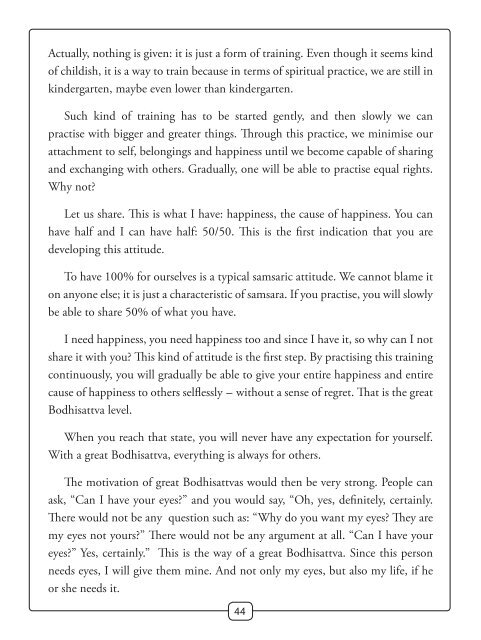Gyalsey_Laglen_v2_24092014_e-book
Gyalsey_Laglen_v2_24092014_e-book
Gyalsey_Laglen_v2_24092014_e-book
You also want an ePaper? Increase the reach of your titles
YUMPU automatically turns print PDFs into web optimized ePapers that Google loves.
Actually, nothing is given: it is just a form of training. Even though it seems kind<br />
of childish, it is a way to train because in terms of spiritual practice, we are still in<br />
kindergarten, maybe even lower than kindergarten.<br />
Such kind of training has to be started gently, and then slowly we can<br />
practise with bigger and greater things. Through this practice, we minimise our<br />
attachment to self, belongings and happiness until we become capable of sharing<br />
and exchanging with others. Gradually, one will be able to practise equal rights.<br />
Why not<br />
Let us share. This is what I have: happiness, the cause of happiness. You can<br />
have half and I can have half: 50/50. This is the first indication that you are<br />
developing this attitude.<br />
To have 100% for ourselves is a typical samsaric attitude. We cannot blame it<br />
on anyone else; it is just a characteristic of samsara. If you practise, you will slowly<br />
be able to share 50% of what you have.<br />
I need happiness, you need happiness too and since I have it, so why can I not<br />
share it with you This kind of attitude is the first step. By practising this training<br />
continuously, you will gradually be able to give your entire happiness and entire<br />
cause of happiness to others selflessly - without a sense of regret. That is the great<br />
Bodhisattva level.<br />
When you reach that state, you will never have any expectation for yourself.<br />
With a great Bodhisattva, everything is always for others.<br />
The motivation of great Bodhisattvas would then be very strong. People can<br />
ask, “Can I have your eyes” and you would say, “Oh, yes, definitely, certainly.<br />
There would not be any question such as: “Why do you want my eyes They are<br />
my eyes not yours” There would not be any argument at all. “Can I have your<br />
eyes” Yes, certainly.” This is the way of a great Bodhisattva. Since this person<br />
needs eyes, I will give them mine. And not only my eyes, but also my life, if he<br />
or she needs it.<br />
44


